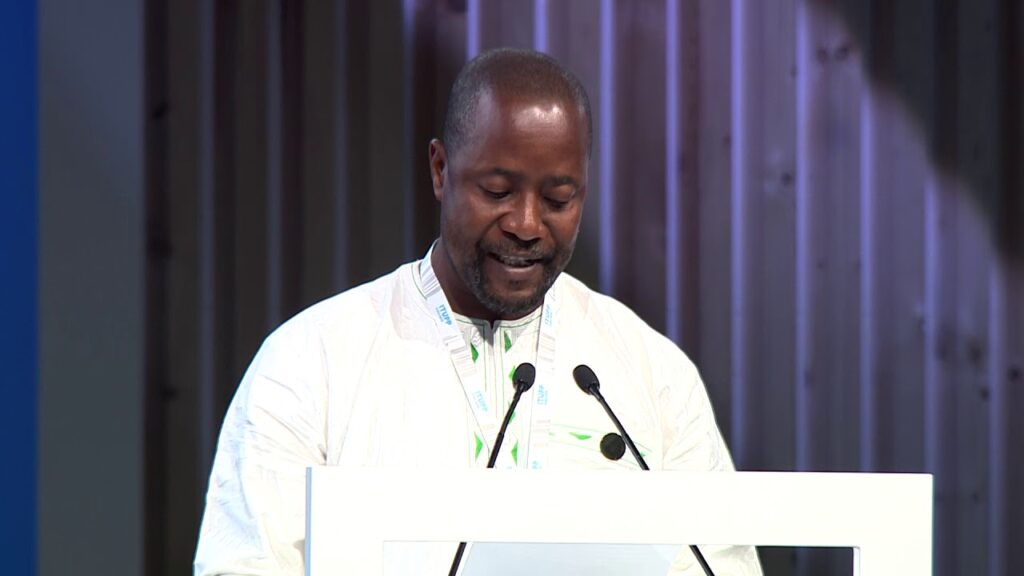By Janet Sesay
The Ministry of Information and Communications in collaboration with other stakeholders across the government, has crafted a draft National Digital Transformation Roadmap which will extend from 2019 to 2029.
This project aims at promoting the up scaling of the use of digital technologies in Sierra Leone and that the draft strategy outlines government’s vision on the digital roadmap on critical policy actions, legal and regulatory frameworks, institutional reforms, programs and projects that will be adopted to develop a digital economy to support the achievement of the National Development Goals.
Speaking to stakeholders and the press at a conference held yesterday at the Golden Tulip Conference Hall Aberdeen, the Permanent Secretary,Ministry of Information and Communications, Augustine Sheiku disclosed that President Julius Maada Bio recently launched the country’s Medium-Term National Development Plan for 2019-2023 with the theme “Education for Development” anchoring on the “New Direction paradigm for improving people’s lives through education, inclusive growth and building a resilient economy.
He said this will affect the vision of the Information Ministry within the context of the National Development Plan to 2029 and that Sierra Leone will become a digital inclusive society with digital technology as the means to unleash the innate potential of every citizen to leapfrog the country’s socio-economic development.
The Chief Minister who represented the Honorable Vice President of the Republic of Sierra Leone, David Francis, informed that across Africa the pace of the use of digital is impacting the ordinary lives of the people as it is now a normal way of doing businesses across the world, especially when doing shopping.
He said in Sierra Leone people use Western Union, Money Gram and Orange monies to send and receive money across the country, adding that all this has been made possible as a result of the superfast cyber security in the country.
He also spoke on the significant change of the digital economy in our daily lives especially market women.
Deputy Minister of Planning and Economic Development, Robert Chakanda said he is pleased that the event has brought together key decision makers from both government and private sectors to build new relationships and strengthen private public partnership which, he assured, will be both interactive and productive.
He revealed that the Ministry of Planning and Economic Development will therefore work in collaboration with the Ministry of Information and Communications to develop the necessary strategies on the digital transformation that will support the implementation of the National Development Plan.
Robert Chakanda furthered that the transformative benefits of digital technologies include broad bands are clear and it increases job creation, better community, civic engagement, improved trade and commerce, improved government services, facilitates social interaction and a lot more.
According to him, such economic digital technologies are widely acknowledged as enablers for capital and social growth, and this has the potential of enabling entire new industries and introducing significant efficiencies in all sectors.
Robert Chakanda went on that government therefore is putting premium on the importance of digital technologies such as broadband and internet service to national development agenda as manifested in its effort to create conducive policy and regulatory environment, and investing in the modernization of the National Terrestrial Fiber Backbone Network.
Deputy Minister of Information and Communications, Mamady Gobeh Kamara reiterated that the Ministry of Information and Communications is a government body mandated with the responsibility of providing policy and regulatory environment framework for the information and its sectors.
Mamady Gobeh Kamara said the roles of the Information Ministry entail among others excising government’s ownership interest in ICT related institutions and program to fit them into the sectors’ holistic requirement in the context of the economic and social development plans of the state.
According to Deputy Information Minister, government recognizes strong leadership with appropriate governance mechanisms supported by relevant legal provisions and legislation regulatory framework and institutional structures that are needed to ensure that the benefit of digital technologies are fully realized and contributes to the country’s national development.
She concluded that better coordination of digital technology interventions are required to ascertain role clarity to avoid duplication of efforts to maximize the use of limited available resources, and that this requires strong partnership and coordination to enhance the productive use of expertise to effectively implement the National Digital Transformation Roadmap.
The World Bank Sierra Leone Country Manager, Madam Grilpin Marttin and the Chief Executive Officer Orange Sierra Leone, Madam Aminata, also made salient statements on the National Digital Transformation Roadmap.
